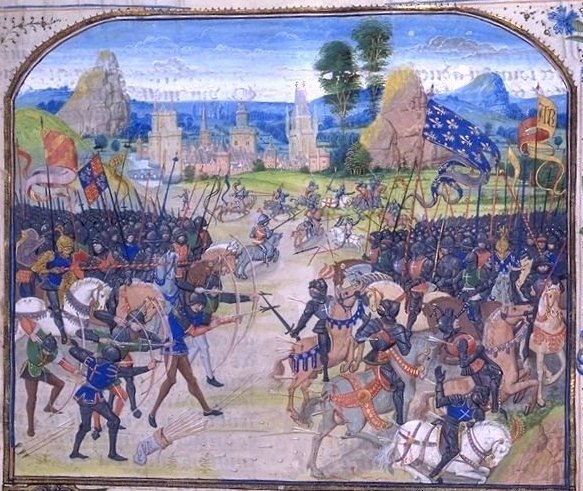Mayhem And Its Meaning
 Much speculative literature, Christian or otherwise, is marked by mayhem—a violent disruption to life and/or to society. Often mayhem shows up in the form of an actual battle.
Much speculative literature, Christian or otherwise, is marked by mayhem—a violent disruption to life and/or to society. Often mayhem shows up in the form of an actual battle.
J.R.R. Tolkien’s The Hobbit ends in the dramatic Battle of Five Armies, for example, when old animosities between dwarfs and men are subsumed in the conflict against the army of goblins and Wargs. Geroge Lucas’s Star Wars IV: A New Hope is set in a universe suffering mayhem because of the civil war between the Federation and the Rebels. Similarly, Prince Caspian by C.S. Lewis takes place in the middle of a conflict between the Old Narnians and the Telmarines who have taken control.
Other stories with grand battles that come to mind include The Lion, the Witch, and the Wardrobe by Lewis, The Black Cauldron and The High King by Lloyd Alexander, Return of the Guardian King by Karen Hancock, From Darkness Won by Jill Williamson, The Door Within trilogy by Wayne Thomas Batson, and Daughter of Light by Morgan Busse.
Tolkien’s Lord of the Rings trilogy might be the benchmark for grand battles, notably in the battle of Helm’s Deep in The Two Towers, the Battle of the Pelennor Fields and the Battle of Bywater in The Return of the King.
Not all mayhem is the direct result of an actual battle. Much occurs as a result of the threat of battle or from the efforts to escape a superior force. Certainly Book 1 of Fellowship of the Ring makes the most of the disruption of Frodo’s life and plans by the arrival of the Black Riders and their subsequent efforts to hunt Frodo down. The ultimate confrontation takes place following a skirmish on Weathertop as the wounded Frodo escapes on the elfen horse and reaches the Ford of Bruinen, barely avoiding the ambush of the nine Black Riders.
Another similar near miss took place in episodes of Star Trek: The Next Generation as the crew of the Enterprise sought to evade the Borg. Then too, in The Hobbit Bilbo discovers the One Ring in the goblins’ tunnels as he tries to avoid capture. He must then escape Gollum as well.
Not all mayhem comes from attempted or actuated assault. Some is the result of corrupting influence. In The Two Towers Wormtongue, for instance, nearly handed the men of Rohan over to Saruman because of his poisonous council to King Théoden. Saruman himself turned traitor and held Gandalf captive, preventing him from meeting Frodo when he’d promised. In Lewis’s The Last Battle, Shift duped Puzzle into pretending to be Aslan, throwing Narnia into confusion. In The Silver Chair an enchantress held the true prince captive by a spell that made him forget who he was.
Some of the most powerful and effective mayhem results in defeat of the forces of good, at least for a time. The White Witch killed Aslan on the stone table, Gandalf fell to his death in the Mines of Moria, Captain Picard in an episode of Star Trek: The Next Generation is captured by the Borg and turned into one of them, and the orcs kill Boromir in the opening of The Two Towers. Perhaps one of the best examples of this is in Shannon Dittemore’s Angel Eyes but because it is a fairly new release, I don’t want to give any specifics in order to avoid spoilers.
Why does mayhem play such an important role in speculative fiction? The clearest and best explanation is that these stories reveal the great struggle of the world–the struggle between the rebel Satan and God. All of creation is aligning with one or the other. The skirmishes, the battles, the sacrifices in speculative fiction are echoes of God’s great triumph over sin and death and His yet-to-take-place final judgment over those who stand against Him.
While stories in the general market are not intentionally reflecting this spiritual reality, they nonetheless reveal the truth that the world is not as it should be, that there are forces of evil, seemingly insurmountable at times, against which forces of good must strive.
Mayhem in speculative fiction also shows that the struggle isn’t just external. Mankind struggles against that part of ourselves that seems bewitched or entrapped or bound to a chair.
It also shows that the conflict has consequences. If left unchecked, evil spreads, but even when it is resisted, people die and the world changes. Still, hope infuses most speculative fiction, and ultimately Lewis showed it best when his characters didn’t leave Narnia but went further up and further in.
What are your favorite battles in speculative fiction? Which ones have I overlooked? What other purpose might they serve besides showing the ultimate battle between spiritual forces?








































“Geroge Lucas’s Star Wars IV: A New Hope is set in a universe suffering mayhem because of the civil war between the Federation and the Rebels.”
Empire, not Federation. That’s the Prequels.
Thanks, Kaleb. Good catch.
Becky
What a wonderful post. Sometimes as i write I wonder… do others see this conflict, or not? You place great feeling behind the message that I hope others grab onto for together we move for Christ. Here is my blog for the morning with a similar theme and a question for your community. I’m not satisfied that we let the ‘conflicts of old’ define us as Christian writers. How about challenging you and I to write ‘a new conflict’ that will engage this nation as never before, to bring His message of light and Life to all who believe. That is my goal. Is it for you?
A Hearty Congratulations to those staunch democrats who stood up for Christ, who, with daring in direct opposition to the party elite, stood together to demand return of God and Jerusalem as the capital of Israel. I not only recognize this Christian stand for God but applaud you openly for doing so. As much as it looked like you standing against your leaders, It is also a stand for His light against the spiritual powers of darkness. Thank you for doing so. May your stand help others who find themselves having to make the same choice, for His light or the deceit of darkness.
But what is the Real Motive of those who initiated this action, to remove God from our national profile? What is next? Do remember the angst when first prayer, then the pledge of allegiance – one nation under God – was removed? Do you remember?
What then is to become of ‘My Country, ‘Tis of Thee, with verse four in direct mention of God – ‘Our fathers’ God to Thee, Author of liberty…, or Protect us by thy might, Great God our King?’ Or what will happen to the Battle Hymn of the Republic or – The Star Spangled Banner. Have you read the third verse recently? ‘And this be our motto: “In God is our trust!”’
Will we no longer be able to stand in unity at a local ball game and sing of our nation under God? As for me and my house – We Will Serve The LORD! How about you friend? What will your choice be? Whether it be a vote, or a decision to stand as never before in front of neighbors and friends, what will your choice be?
1 John 1:5 And this is the message we have heard from Him and announce to you, that God is light, and in Him is no darkness at all. If we say that we have fellowship with Him and yet walk in the darkness, we lie and do not practice the truth.
One of my favorite speculative showdowns is the season five finale of Doctor Who. A league of the Doctor’s enemies have come for the Pandorica, rumored to contain the most feared being in the cosmos. The Doctor manages to scare them off while openly admitting that he doesn’t have a plan. But what makes it really impressive is the twist where we find out what’s really inside…
I’ll have to take your word for that one, Galadriel. It sounds exceptional. (I’m a big fan of twists at the end. 😉 )
And why am I not surprised that Dr. Who was mentioned on this blog? 😆
Becky